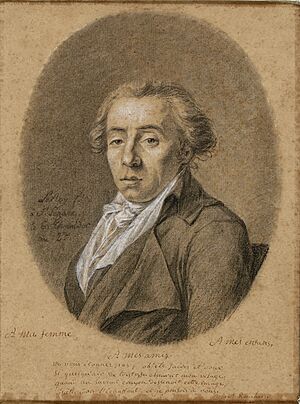Jean-Antoine Roucher facts for kids

Jean-Antoine Roucher (born February 22, 1745 – died July 25, 1794) was a French poet. He lived during an exciting and often dangerous time in France, known as the French Revolution.
Contents
Early Life and Poetry
Jean-Antoine Roucher was born in Montpellier, France. His father was a tailor. Roucher showed a talent for writing early on. He wrote a special poem for the wedding of King Louis XVI and Marie Antoinette. This poem helped him gain the support of an important government official named Turgot. Thanks to Turgot, Roucher got a job collecting taxes on salt.
In 1779, Roucher published his most famous poem, called Les Mois (which means The Months). When people read it before it was published, they liked it a lot. However, once it was officially released, many critics didn't like it. One famous saying about the poem's failure was, "It's the most beautiful shipwreck of the century." This was a clever joke because a big part of the poem describes a shipwreck.
Roucher and the French Revolution
Roucher was a follower of the famous writer Voltaire. He also supported the ideas behind the French Revolution, which aimed to bring more freedom and equality to France. However, Roucher believed in being fair and not going to extremes. He was a moderate, meaning he didn't agree with the most radical groups.
He even led a club that was against the Jacobins. The Jacobins were a powerful political group during the revolution who became very extreme. In 1792, Roucher wrote articles in the Journal de Paris newspaper. In these articles, he spoke out against the harsh rule of some popular leaders who were taking too much power.
Arrest and Final Days
Because of his moderate views and his criticisms, Jean-Antoine Roucher was arrested on October 4, 1793. He was accused of planning against the government while he was a prisoner at Saint-Lazare.
On July 25, 1794, Roucher was sent to the guillotine, a device used for executions. He rode in the same cart as his friend, another famous poet named André Chénier. This was during a very intense period of the revolution known as the Reign of Terror.
Other Works and Legacy
Besides his poetry, Roucher also translated important books. In 1790, he translated Wealth of Nations by Adam Smith, which is a famous book about economics.
After his death, Roucher's son-in-law published his letters from prison. These letters were called Consolations de ma captivité (Comforts of My Captivity) and came out in 1797. In 1834, Roucher's brother, Claude Roucher-Deratte, who was a playwright, wrote a play about Jean-Antoine's death.
Honours in Botany
Jean-Antoine Roucher's name was also used to honor him in the world of plants!
- In 1847, a botanist named Planch. named a group of flowering plants Roucheria after him. These plants are found in places like Nicaragua and other parts of tropical America. They belong to the plant family called Linaceae.
- Later, in 1921, another botanist named Hallier f. named a different group of flowering plants Indorouchera in his honor. These plants are found in Cambodia, Vietnam, and Borneo, and they are also in the Linaceae family. The "Indo" part of the name means they are from the East.
 | Chris Smalls |
 | Fred Hampton |
 | Ralph Abernathy |


